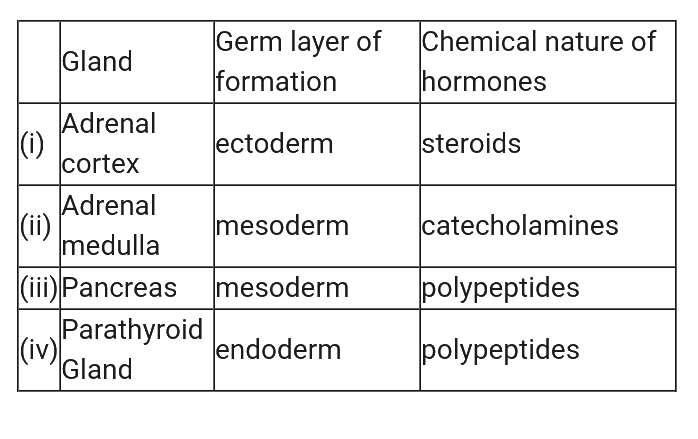What is the chemical nature of hormones?
Step-by-Step Solution:
1. Definition of Hormones:
- Hormones are chemical messengers that are produced in the body. They play a crucial role in regulating various physiological processes.
2. Production of Hormones:
- Hormones are produced by specialized glands known as endocrine glands. These glands are ductless, meaning they release hormones directly into the bloodstream.
3. Transport of Hormones:
- Once released into the bloodstream, hormones travel to their target sites in the body where they exert their effects.
4. Chemical Nature of Hormones:
- Hormones can be classified based on their chemical nature into two main categories:
- Proteinaceous Hormones: Most hormones fall into this category. They are made up of proteins or peptides.
- Steroid Hormones: A smaller group of hormones that are derived from cholesterol.
5. Examples of Proteinaceous Hormones:
- Some common examples include:
- Luteinizing Hormone (LH)
- Follicle Stimulating Hormone (FSH)
- Human Chorionic Gonadotropin (HCG)
- Insulin
- Thyroid hormones (T3 and T4)
6. Examples of Steroid Hormones:
- Examples of steroid hormones include:
- Adrenal hormones (like cortisol)
- Sex hormones (such as testosterone and estrogen)
- Vitamin D and its metabolites
7. Conclusion:
- In summary, hormones are chemical messengers produced by endocrine glands, and they can be broadly classified into proteinaceous and steroid hormones based on their chemical nature.
- Hormones are chemical messengers that are produced in the body. They play a crucial role in regulating various physiological processes.
- Hormones are produced by specialized glands known as endocrine glands. These glands are ductless, meaning they release hormones directly into the bloodstream.
- Once released into the bloodstream, hormones travel to their target sites in the body where they exert their effects.
- Hormones can be classified based on their chemical nature into two main categories:
- Proteinaceous Hormones: Most hormones fall into this category. They are made up of proteins or peptides.
- Steroid Hormones: A smaller group of hormones that are derived from cholesterol.
- Some common examples include:
- Luteinizing Hormone (LH)
- Follicle Stimulating Hormone (FSH)
- Human Chorionic Gonadotropin (HCG)
- Insulin
- Thyroid hormones (T3 and T4)
- Examples of steroid hormones include:
- Adrenal hormones (like cortisol)
- Sex hormones (such as testosterone and estrogen)
- Vitamin D and its metabolites
- In summary, hormones are chemical messengers produced by endocrine glands, and they can be broadly classified into proteinaceous and steroid hormones based on their chemical nature.
Topper's Solved these Questions
Similar Questions
Knowledge Check
The chemical nature of enzyme is :
AfatBcarbohydrateCproteinDhydrocarbon
What is the chemical nature of lecithin ?
View SolutionWhat is the chemical nature of biogas. Name an organism which is involved in biogas production?
View SolutionWhat is the chemical nature of biogas. Name an organism which is involved in biogas production?
View SolutionWhat is the chemical nature of gibberellin?
View SolutionWhat is the chemical nature of tertiary cell wall?
View SolutionWhich of these glands are correctly matched with their embryonic origin and chemical nature of their hormones?

View SolutionThe chemical nature of hormones secreted by αandδ cells of pancreas is
View Solution
